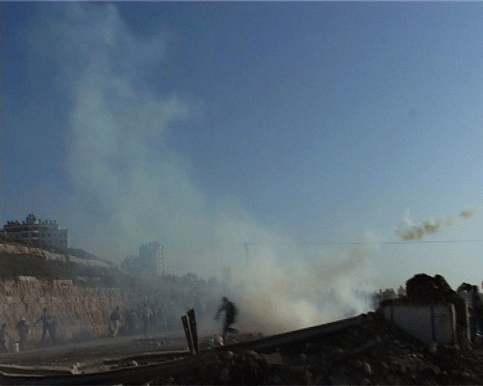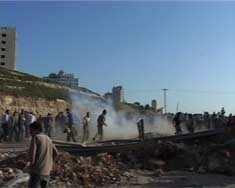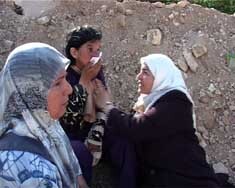24 May 2003

After one day of curfew in Ramallah on May 18 and the two following days of complete siege, Israeli occupying forces suddenly opened the checkpoint on Wednesday. However, Israeli soldiers at the checkpoint closed the checkpoint just as suddenly at around 2 pm, trapping hundreds of ordinary citizens, Birzeit faculty staff and students away from their homes in Ramallah. They were met by tear gas and stun grenades. The checkpoint remained fully closed while Ramallah was being invaded.

People had diligently paved a couple of dirt paths through the lands of Surda village that allow sufficiently powered vehicles to get around the destroyed parts of the road: one is a serpentine creeping over a steep hill that leads to the crossing between the settler by-pass and Ramallah roads. This path can only be taken downhill because of the rough terrain and sharp decline, and there is no escape backwards.

Since early March 2001, academic life on the Birzeit University campus in Birzeit, 20 kilometers north of Jerusalem in the West Bank, has been severely disrupted.
Since March 2002, in the wake of the large-scale invasion by the Israeli army into the West Bank, the campus has become virtually inaccessible to the vast majority of its over 5000 students and 700 faculty and administrative staff. The disruption has been the result of Israeli military actions taken on the road connecting the city of Ramallah to Birzeit and 33 villages in the area. These actions have centered on a stretch of road near the village of Surda, and have consisted in the digging of trenches, the placement of concrete blocks, and periodic piling of dirt mounds to prevent access. A permanent army presence has been established on a hill overlooking this stretch of the road, and all vehicular traffic has been banned. All people, including the disabled, the elderly, and children, must walk distances varying from a few meters to two kilometers (depending on the decisions of the army at any one time) on foot between dirt mounds and trenches.
On many occasions and when soldiers at the checkpoint have decided that there should be no movement on the road, the army has shot live ammunition, tear gas, and sound bombs at people to disperse them from the checkpoint.
These actions have escalated since April 2002, and have been taking place on a daily basis during June 2002. On some occasions, those who have decided to circumvent the checkpoint and walk through the surrounding agricultural fields and hills have been shot at, and at least one person has died as a result of wounds sustained while trying to get around the checkpoint in this manner.
The most immediate impact of the placement of this permanent checkpoint on the Birzeit road has been the severe disruption of education. The current academic year, which should have ended in early June, has been extended indefinitely, especially in view of the near-total ban on the movement of people through the checkpoint.
Students and staff, eager to resume studies, have been trying to reach the campus on a daily basis; the long waits to cross the checkpoint, or the wasted trips when it has been closed, have meant the loss of valuable time, not to mention increased financial burdens. Among the victims of this situation are the several hundred students in their last semester of study at the university. Many of them have made plans to study abroad or work after their graduation. Now these plans must be postponed indefinitely, causing great financial hardship for those students whose families had relied on them to begin working and contributing to family finances during the current difficult economic circumstances in the Palestinian territory.
Related Links: